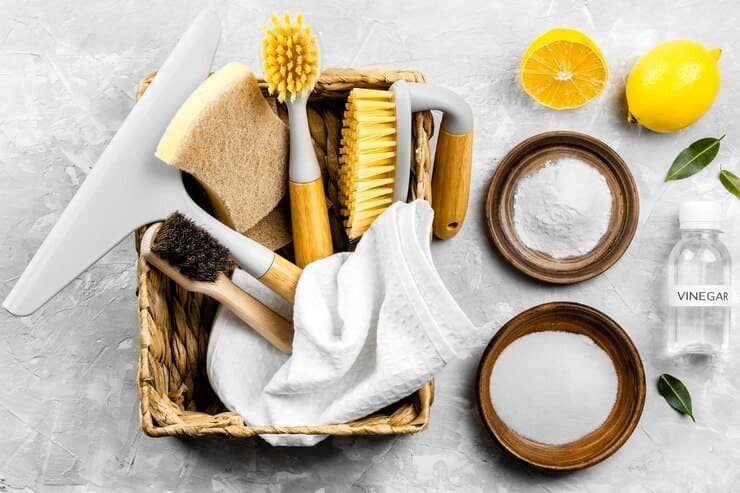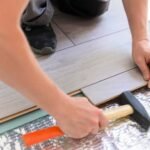With the rise in awareness about the harmful chemicals in many conventional cleaning products, more and more people are seeking natural alternatives that get the job done without compromising health. Luckily, some of the most effective and eco-friendly cleaning solutions can be easily made right at home using common household items. Not only are these do-it-yourself (DIY) natural cleaners better for your health and the environment, they are also often much cheaper than store-bought options.
Switching to natural cleaning products is beneficial for several reasons. Many conventional cleaners contain toxic ingredients like ammonia, bleach, formaldehyde, and artificial fragrances that can irritate eyes, skin, and lungs. When washed down the drain, these chemicals also pollute waterways. In contrast, DIY cleaners made from simple, plant-based ingredients are non-toxic and biodegradable. Going the DIY route allows you to customize your cleaning products to suit your needs and avoid unnecessary chemicals.
Additionally, being able to make your own natural cleaning products means saving money since you likely already have most or all of the ingredients on hand. Common household staples like vinegar, baking soda, lemon juice, and vegetable oil can be used in various combinations to effectively tackle cleaning tasks throughout your home. With a little know-how, you can whip up safe and inexpensive cleaners that get surfaces sparkling and smelling fresh.
Common Household Items for Natural Cleaning
Numerous household items have cleansing and disinfecting properties that make them useful for do-it-yourself cleaning recipes. Here are some of the most versatile ingredients to have on hand:
1. Vinegar
Distilled white vinegar is a mild acid that can help cut through grease, soap scum, and mineral deposits. It has antibacterial properties and acts as a natural deodorizer. Avoid using vinegar on stone surfaces.
2. Baking Soda
Baking soda or sodium bicarbonate is a naturally occurring mineral with a slightly abrasive texture that lifts dirt and stains. It also helps absorb odors and has a mild bleaching effect.
3. Lemon
Lemon juice contains citric acid which cuts through grease and grime. The juice also has antibacterial and antiseptic qualities, while the peel contains oils that provide a fresh scent. Avoid using lemon on hardwood floors.
4. Olive Oil
Olive oil conditions and polishes wood furniture. The oil also helps lift dirt from surfaces and can be used to make fragrant cleaning recipes.
5. Salt
Table salt works as a gentle scouring agent to lift stuck-on food and grease. The coarse grains also help scrub off residue.
6. Hydrogen Peroxide
The antibacterial and bleaching properties of hydrogen peroxide make it ideal for disinfecting and whitening surfaces. Take care when using it on colored materials.
7. Essential Oils
Essential oils like lavender, eucalyptus, tea tree, lemon, and peppermint not only make your homemade cleaners smell amazing, they also have natural disinfecting qualities.
Now let’s take a look at some of the effective cleaning solutions you can make using these ingredients.
Cleaning Solutions Using Vinegar
Due to its potent acidity and antibacterial properties, vinegar is one of the most versatile ingredients for DIY natural cleaning recipes. Here are some ways it can be used:
1. All-Purpose Cleaner
Combine 1 part water and 1 part vinegar in a spray bottle. Spritz on surfaces and wipe clean with a microfiber cloth. The solution will cut through dirt and grease on most washable hard surfaces.
2. Window Cleaner
Mix 2 cups water, 1/4 cup vinegar, and 1/2 teaspoon liquid soap in a spray bottle. Shake well and spray onto windows. Wipe with newspaper or a lint-free cloth. The vinegar helps dissolve grime and soap scum while leaving windows streak-free.
3. Drain Cleaner
Pour 1/2 cup baking soda down the drain followed by 1 cup vinegar. The chemical reaction causes fizzing that will help break down gunk, grease, and hair buildup in pipes. Flush with hot water after the fizzing stops. Repeat as needed for tough clogs.
4. Fabric Softener
Add 1/2 cup vinegar to the rinse cycle to naturally soften clothes and remove residue without synthetic fragrances. It also acts as a deodorizer. The vinegar smell dissipates as clothes dry.
Cleaning Solutions Using Baking Soda
The abrasive texture of baking soda combined with its odor-absorbing powers make it ideal for tackling all kinds of cleaning challenges. Here are some smart ways to use it:
1. Scouring Cleaner
Sprinkle baking soda onto a damp sponge and scrub onto surfaces to remove stuck-on grime and stains from countertops, bathtubs, appliances, grills, and more. Rinse thoroughly after scrubbing.
2. Toilet Bowl Cleaner
Sprinkle baking soda into the toilet bowl and spray with vinegar. Let fizz for 10 minutes before scrubbing with a toilet brush. The combination helps break down grime, disinfect, and deodorize.
3. Carpet Freshener
Sprinkle baking soda liberally over carpets. Let sit for 15 minutes before vacuuming up. The baking soda will help absorb odors and lift dirt from fibers.
4. Oven Cleaner
Make a paste with equal parts baking soda and water. Spread onto oven surfaces and let sit overnight before wiping away grime and burnt-on food. Baking soda loosens stubborn baked-on messes.
Cleaning Solutions Using Lemon
Bright, fresh, and naturally antiseptic, lemon is tailor-made for cutting through grease and enhancing cleaning power. Some smart uses include:
1. Fruit and Vegetable Wash
Add 2 tablespoons lemon juice to a bowl of cool water. Soak produce for 5 minutes then rinse. The acidity of the lemon juice helps kill bacteria and surface pesticides.
2. Disinfectant Cleaner
Mix the juice of 1 lemon with 1 cup water and 1/2 cup vinegar in a spray bottle. Spritz onto surfaces and wipe down with a clean cloth. The acidity disinfects while the fresh lemon scent deodorizes.
3. Air Freshener
Slice a lemon and put slices into an open container. Place containers around rooms to provide a light, uplifting citrus fragrance. Can also simmer lemon slices in water on the stove.
4. Stain Remover
Rub a lemon wedge directly onto tough stains on cutting boards, cookware, and even clothing. Let sit for 5 minutes before rinsing. The acid breaks down grime.
Cleaning Solutions Using Olive Oil
The moisturizing properties of olive oil make it perfect for cleaning and protecting wood furnishings and other surfaces prone to drying out. Here are some uses:
1. Wood Furniture Polish
Mix 1 part olive oil and 1 part lemon juice. Apply a small amount to a clean, soft cloth and rub onto wood furniture. Buff to moisturize, condition, and make wood shine.
2. Leather Conditioner
Rub a few drops of olive oil into dry leather goods like shoes, bags, jackets, and furniture. Wipe away excess. Regular application keeps leather supple and prevents cracking.
3. Makeup Brush Cleaner
Swirl makeup brush bristles in olive oil to loosen pigment and buildup. Rinse under warm water and soap until the water runs clear. Follow with a brush conditioner.
4. Shoe Polish
Buff scuffs on leather shoes with a drop of olive oil on a soft cloth. The oil blend with shoe polish to moisturize leather and make shoes shine.
Cleaning Solutions Using Salt
Plain table salt is an effective and non-toxic cleaning and scrubbing agent for multiple uses:
1. Scouring Cleaner
Sprinkle salt onto a damp sponge or cloth to gently scrub pots, pans, cooking utensils, and surfaces. Rinse thoroughly afterwards. The salt grains provide light abrasion to lift dirt.
2. Ice Melt
Sprinkle salt onto icy walkways and driveways to melt the ice by lowering the freezing point of water. Safer for concrete than calcium chloride pellets.
3. Dishwasher Rinse Aid
Add 1/2 cup salt to the bottom of your empty dishwasher and run a normal cycle. The salt will help remove grease residue and film from dishwasher walls and improve cleaning ability.
4. Water Softener
Add 1 cup salt to laundry wash cycles to reduce water hardness which allows soap and detergent to lather properly for better cleaning.
Cleaning Solutions Using Hydrogen Peroxide
A mild bleach and disinfectant, hydrogen peroxide has excellent cleaning capabilities for tackling stains and sanitizing surfaces. Some smart uses are:
1. Mold and Mildew Remover
Mix 1 part hydrogen peroxide with 2 parts water in a spray bottle. Lightly mist onto areas prone to growing mold like tile grout and shower walls. Allow to sit for 10 minutes before rinsing away. Kills mold and bleaches surfaces.
2. Stain Remover
Lightly dab hydrogen peroxide onto blood, coffee, wine, or fruit stains on fabric. Allow to bubble for 5 minutes before rinsing and washing as normal. Helps lift set-in stains.
3. Disinfectant Cleaner
Combine 1 cup hydrogen peroxide, 1/4 cup lemon juice, and 1/2 cup water in a spray bottle. Spritz onto surfaces and wipe clean with a cloth. Kills germs and bacteria on kitchen and bathroom surfaces.
4. Toilet Bowl Cleaner
Pour 1/4 cup hydrogen peroxide into the toilet bowl. Let sit for 30 minutes before scrubbing and flushing. The bubbling helps lift grime and disinfect.
Cleaning Solutions Using Essential Oils
Beyond just making your homemade cleaners smell amazing, essential oils add natural antibacterial and antimicrobial power for a deeper clean:
1. Air Freshener
Add several drops of lemon, peppermint, or lavender oil to water in a spray bottle. Mist over fabrics and room air to provide a light aroma. Can also use with an essential oil diffuser.
2. Disinfectant Cleaner
Add 5-10 drops of tea tree, eucalyptus, or lemon essential oil to an all-purpose vinegar cleaning solution. Wipe down surfaces to disinfect and deodorize.
3. Fabric Softener
Add a few drops of lavender or vanilla oil during the rinse cycle to lightly scent fabric softener. Provides a light floral or sweet aroma to laundry.
4. Room Deodorizer
Simmer cinnamon sticks and cloves in water and add 5 drops orange essential oil. Provides a festive scent that fills the room. Can also use with oil diffuser.
Conclusion
Cleaning and maintaining a home doesn’t need to involve harsh chemicals or expensive products. Simple, all-natural solutions made from common household staples like vinegar, baking soda, lemon, and essential oils can tackle even the toughest dirt and grime. Not only are these homemade cleaners better for your health and the environment, they save you money too.
With just a few basic ingredients and simple recipes, you can quickly whip up customized cleaners that are tailored to your specific cleaning needs. Try starting with some versatile solutions like an all-purpose vinegar-water mix or a baking soda abrasive scrub. Experiment with different scent combinations by adding your favorite essential oils. Soon you’ll discover the joy and satisfaction that comes from maintaining a clean, healthy home using products made with your own two hands.




No Comment! Be the first one.